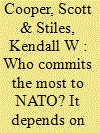| Srl | Item |
| 1 |
ID:
061066


|
|
|
|
|
| Publication |
Winter 2003-04.
|
|
|
|
|
|
|
|
|
|
|
|
|
|
|
|
| 2 |
ID:
182681


|
|
|
|
|
| Summary/Abstract |
Studies of NATO rely heavily on military spending as a fraction of GDP as the key indicator of members’ contribution to the alliance, but a growing number of scholars have challenged this approach. We suggest that each member’s public goods provision is a better measure of commitment to the alliance. In the case of post-Cold War NATO, out-of-area troop deployments (adjusted for population) constitute one of the strongest indicators of a state’s contribution to public goods. Providing troops for NATO missions in Afghanistan, Kosovo, and Bosnia-Herzegovina is one of the clearest signals of high commitment to the alliance. Using deployment data from 2004 to 2018, we show that there is evidence of disproportionate burden-sharing within the alliance. Countries like Slovenia, Denmark, the USA and UK contributed far more to NATO deployments than others like Turkey, Spain, Poland, and Portugal. We also use the data to begin examining possible causes of these disparities. We find that wealthier countries, countries that spend more on their militaries, and newer alliance members are more likely to contribute. Our indicator and first-cut model open avenues for further research on why some members demonstrate higher commitment to NATO than others.
|
|
|
|
|
|
|
|
|
|
|
|
|
|
|
|
| 3 |
ID:
083659


|
|
|
|
|
| Publication |
2008.
|
| Summary/Abstract |
In this paper, we identify authority as an important dimension of variance among international institutions. Essentially, the greater the authority of i states have yielded to them. Highly authoritative institutions can make decisions that legally bind domestic governments on specified issues even without those governments' consent. Over the past 20 years, scholars have viewed the evolution of international institutions largely through the lens of state motives. We argue that it is time to think more systematically about the role of the structure of the international system. Two factors that impact international structure-previously existing institutions and the presence of systemic shocks-can complement theories of actor motives to better account for the level of sovereignty yielded to authoritative international institutions. We illustrate the potential importance of including structural variables by applying the argument to sets of cases in currency cooperation and human rights. We find that structural factors increase the probability of states yielding sovereignty to international institutions, though structural factors are only a permissive cause of institution formation
|
|
|
|
|
|
|
|
|
|
|
|
|
|
|
|